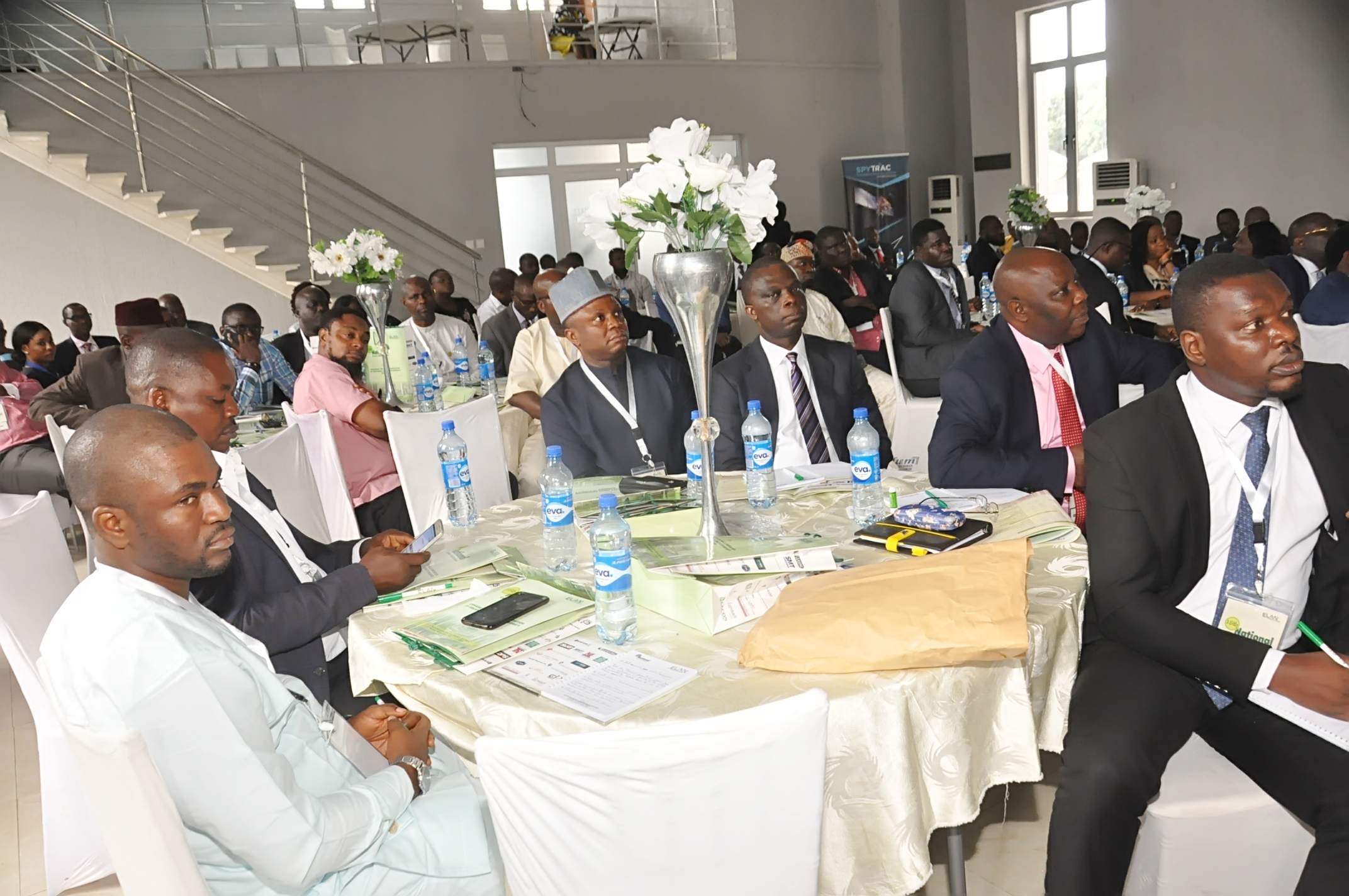
COMMUNIQUE ISSUED AT THE 16TH NATIONAL LEASE CONFERENCE ORGANISED BY THE EQUIPMENT LEASING ASSOCIATION OF NIGERIA (ELAN), HELD ON THURSDAY, 15TH NOVEMBER 2018 AT MITROS RESIDENCES HOTEL, IBARA – ABEOKUTA, OGUN STATE
1.0 BACKGROUND
In furtherance of its objective of promoting the ideals of leasing in Nigeria and its advocacy drive, the Equipment Leasing Association of Nigeria (ELAN) organised its 16th National Lease Conference held on Thursday, 15th November 2018 at Mitros Residences Hotel, Ibara – Abeokuta, Ogun State. The theme of this year’s conference was “ENHANCING THE VALUE PROPOSITION OF EQUIPMENT LEASING TO NIGERIA’S ECONOMY”.
The Annual National Lease Conference is the biggest gathering of stakeholders in the Nigerian leasing industry, which has become a major platform for the discussion of pertinent issues affecting the development of the leasing industry and the economy at large. This year, which marks the 16th Anniversary of the National Lease Conference, was packaged to stimulate valuable investments for sustainable growth and development in our national economy, further entrench the value propositions of equipment leasing to developmental initiatives, explore the emerging opportunities in our national economy, and create effective platform for business networking.
The conference considered among other things, the relevance of leasing to the achievement of Government developmental initiatives at all levels, and the issues focusing on the development of the Nigerian Leasing industry for an impactful contribution to the National economy.
The conference was attended by high net worth professionals from within and outside the leasing industry, most especially the business community in Ogun State comprising the Nigerian Medical Association, Nigerian Association of Small Scale Industrialists, National Association of Small and Medium Scale Enterprises, Leasing Practitioners, Financiers, Government MDAs amongst all. Paper presentations were done by erudite scholars, with the Panel Discussion being handled by distinguished Panelists. Key papers and subjects include:
- Public Sector Leasing: Enhancing Efficiency, Opportunities and Critical Success Factors – Adegboyega Adegun, General Manager, Corporate Banking Group, Sterling Bank Plc
- Scaling up Access to Finance for SMEs – The imperative of Leasing – Jonathan Gigin, Senior Financial Sector Specialist/Regional Programme Manager, International Finance Corporation
- Scaling up Access to Finance for SMEs – Role of Credit Bureau, Tunde Popoola, Chairman, Credit Bureau Association of Nigeria (CBAN)
- Exploring Alternative Funding Sources for Leasing – Gregory Ogbebor, Head, Structured Finance, Lotus Capital Limited
- Investing in Critical Sectors of the Nigerian Economy: Opportunities, Policy Framework and Risks Analysis, Emmanuel Ajayi, MD/CEO Swiss Biostadt Limited (Healthcare) & Hajia Fatima Shinkafi (Mrs), Executive Secretary/CEO, Solid Minerals Development Fund (Mining)
This was followed by a panel discussion on “Harnessing the Developmental Initiatives of Equipment Leasing in Nigeria’s Economic Agenda – Role, Benefits & Institutional Challenges. The Panelists were: Mr Tunde Netufo, Managing Director/CEO Frontline Trust Limited; Alex Mbakogu, Executive Director/Chief Financial Officer, C&I Leasing Plc; Patrick Iniovosa, Managing Director/CEO Stirling Trust Company Limited and Adepeju Adebajo (Mrs), Hon. Commissioner for Agriculture, Ogun State represented by Mr Ibrahim B. A. The Panel Discussion session was moderated by Alfred Okugbeni, Chairman, ELAN Board’s Programme Committee.
2.0 OBSERVATIONS
Conference observed that:
- The Federal Government’s initiatives to revitalise the economy, including the Economic Recovery and Growth Plan (ERGP), has been showing positive signs. Recent statistics indicate estimated GDP growth of 2.1% for 2018 up from 0.8% in 2017, reflecting improved oil prices, revenue and production as well as the recently introduced foreign exchange measures that contribute to better foreign exchange availability and rate stability.
- The positive trajectory for the economy should gain steam as the government begins to implement the structural reforms outlined in the ERGP and the multiplier effects of investment in infrastructure alongside the improvement in business environment begin to manifest. However, there is the need for the growth to be inclusive, especially in the areas of job creation, poverty alleviation and economic diversification.
- The attributes of leasing which centre on easy and convenient access to capital equipment, can be brought to bear to support the government developmental initiatives and achieve inclusive growth.
- Leasing, has the capacity to provide the public sector with access to certain equipment to facilitate infrastructure investments, developing and providing solutions that fit their specific needs and requirements.
- The impactful visibility of leasing is increasing in Nigeria, contributing to capital formation in the economy and creating wealth. In 2017, outstanding lease volume was estimated at N1.44trillion, up from 1.26trillion in 2016, representing a growth rate of 14.5 percent. Assets worth over N8.98trillion have been financed in the past fifteen years and the outlook for the industry remains optimistic.
- Leasing as a catalyst, has the capacity to bridge the wide financing gaps in all sectors of the economy and the increasing relevance of leasing to capital formation with the challenge of access to finance especially to MSMEs, to enhance their productivity and profitability and make meaningful contribution to GDP.
- The public sector presents huge business opportunities to the leasing industry in major sectors of the economy including Agriculture, Solid Minerals, Transportation (Haulage/Commuting), Healthcare etc.
- There is need to strengthen the capacity of leasing industry through the provision of appropriate funding mechanism to finance lease transactions. The prevalence of short term funding sources, which are usually expensive, limits the capacity of lessors to finance leases. This issue has been aggravated with the devaluation of the Naira, which increases the cost of assets and the waning appetite of banks to lend money.
- There is need for players in the leasing industry to adopt sound corporate governance practices, and proper record keeping in order to attract the necessary support.
- Enhanced knowledge of the market especially the MSMEs, specialised equipment, new technologies to the market, forming appropriate synergy with a technical partner or local sponsor amongst others will facilitate Lessors’ success factors in the industry.
- In order to further give impetus to the Equipment Leasing Act 2015, there is need for the establishment of fast track courts, to address leasing related issues.
- The leasing industry should equally collaborate with relevant partners such as credit bureaus to facilitate credit checks, monitoring, collection and portfolio management al geared to improve their leasing packaging and transactions.
- In order to deepen the penetration and utilisation of leasing in Nigeria, there is need for increased advocacy and awareness on the features and benefits of leasing, this will go a long way to erode the outright purchase mentality of most Nigerians.
- To facilitate the developmental objectives of the Equipment Leasing Act 2015, the Equipment Leasing Registration Authority needs to be inaugurated and operations kick started. The Equipment Leasing Act was enacted as part of the support framework for the leasing industry.
3.0 CONSEQUENTLY CONFERENCE RESOLVED AS FOLLOWS:
1. Government at all levels should utilise equipment leasing to facilitate its developmental agenda, this will enhance infrastructural development, improve budget system and control as well as create wealth for national economic development. The leasing industry is willing to collaborate with Government to achieve the set out economic initiatives.
2. Government should include leasing in the various intervention funds for the development of targeted sectors of the economy, this will enable the leasing industry contribute more to national economic development.
3. ELAN should support players in the industry to build formidable portfolios, form synergy as well as build their capacity in specialised market.
4. The leasing industry should increase its advocacy and lease awareness campaign, engaging with Government and other stakeholders.
5. The Equipment Leasing Act 2015 is a major framework on leasing. ELAN should work with other stakeholders to fast track its implementation especially the operations of the Equipment Leasing Registration Authority.
In conclusion, the leasing industry remains significant in stimulating more valuable investments at this period where the economy is still struggling to get out of the woods.

